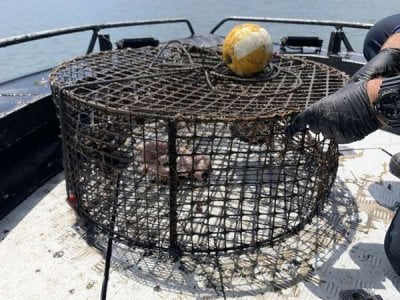Fishers catch $1,600 in fines for breaking one lesser-known rule
By
Danielle F.
- Replies 6
Australia's waterways are more than just a piece of nature's beauty.
It's also a place where the law is taken very seriously, especially when it comes to respecting marine resources and the property of others.
This was a costly lesson for two individuals for violating a little-known rule implemented on Aussie shores.
Fishers from the Moreton Bay region received $1,613 worth of fines each for interfering with crab pots.
Fisheries Queensland's recent post should be a stern reminder to all fishers and boaties to follow the rules.
'We mean it when we say 'if it's not yours, leave it,' the organisation wrote.
Tampering with fishing gear has been a prevalent issue recently.
Last year, Fisheries Queensland received 138 complaints across the state.
These complaints led to 60 detected offences for subsequent enforcement action.
The Queensland Boating and Fisheries Patrol (QBFP) officers remain vigilant in targeting high-risk areas.
They have also relied heavily on the community to report any unlawful activities.
The community has been supportive of the Fisheries' actions thus far.
However, many locals believed that stiffer penalties could deter violators.
'Confiscate their boats, especially for repeat offenders,' one suggested.
'Punishment being a disqualified licence would slow them down a bit, I would reckon,' another wrote.
Fishers and locals also pointed out another growing concern.
'Ghost pots'—often discarded or abandoned pots—continue to trap marine life and have become a significant threat to ecosystems.
These ghost pots could entangle and kill threatened species such as turtles and sharks.
In response to the issue, OceanEarth Foundation, in partnership with OzFish Unlimited, launched the Great Aussie Crab Pot Review.
This initiative should address the impact of ghost pots in the ocean and find solutions to clean them up.
Anissa Lawrence, Managing Director of the OceanEarth Foundation, emphasised the importance of fishers and their role in tackling environmental challenges.
'Fishers are part of the fabric of our community, and we are asking them to work with us to try and solve the issue and reduce the impact this ghost gear is having on our ecosystems and wildlife,' Ms Lawrence shared.
The QBFP's efforts to clean up ghost pots continue, with hundreds of crab pots and freshwater traps already removed.
These clean-up operations should prevent future harm to marine life and preserve healthy waterways.
So, take this as a cautionary tale, especially when you have fishing plans underway.
Always adhere to the rules when enjoying Australia's beautiful waterways.
If you come across any ghost gear, report it to the authorities immediately.
By doing so, everyone may still enjoy fishing and boating activities for years to come.

Have you ever encountered ghost pots or other forms of discarded fishing gear during your outings? What measures should be taken to prevent such occurrences? Share your thoughts and experiences in the comments below.
It's also a place where the law is taken very seriously, especially when it comes to respecting marine resources and the property of others.
This was a costly lesson for two individuals for violating a little-known rule implemented on Aussie shores.
Fishers from the Moreton Bay region received $1,613 worth of fines each for interfering with crab pots.
Fisheries Queensland's recent post should be a stern reminder to all fishers and boaties to follow the rules.
'We mean it when we say 'if it's not yours, leave it,' the organisation wrote.
Tampering with fishing gear has been a prevalent issue recently.
Last year, Fisheries Queensland received 138 complaints across the state.
These complaints led to 60 detected offences for subsequent enforcement action.
The Queensland Boating and Fisheries Patrol (QBFP) officers remain vigilant in targeting high-risk areas.
They have also relied heavily on the community to report any unlawful activities.
The community has been supportive of the Fisheries' actions thus far.
However, many locals believed that stiffer penalties could deter violators.
'Confiscate their boats, especially for repeat offenders,' one suggested.
'Punishment being a disqualified licence would slow them down a bit, I would reckon,' another wrote.
Fishers and locals also pointed out another growing concern.
'Ghost pots'—often discarded or abandoned pots—continue to trap marine life and have become a significant threat to ecosystems.
These ghost pots could entangle and kill threatened species such as turtles and sharks.
In response to the issue, OceanEarth Foundation, in partnership with OzFish Unlimited, launched the Great Aussie Crab Pot Review.
This initiative should address the impact of ghost pots in the ocean and find solutions to clean them up.
Anissa Lawrence, Managing Director of the OceanEarth Foundation, emphasised the importance of fishers and their role in tackling environmental challenges.
'Fishers are part of the fabric of our community, and we are asking them to work with us to try and solve the issue and reduce the impact this ghost gear is having on our ecosystems and wildlife,' Ms Lawrence shared.
The QBFP's efforts to clean up ghost pots continue, with hundreds of crab pots and freshwater traps already removed.
These clean-up operations should prevent future harm to marine life and preserve healthy waterways.
So, take this as a cautionary tale, especially when you have fishing plans underway.
Always adhere to the rules when enjoying Australia's beautiful waterways.
If you come across any ghost gear, report it to the authorities immediately.
By doing so, everyone may still enjoy fishing and boating activities for years to come.
Key Takeaways
- Two individuals were fined $1,613 each after they interfered with crab pots in the Moreton Bay region.
- Fisheries Queensland and the Queensland Boating and Fisheries Patrol (QBFP) strongly enforced regulations for unlawful gear interference.
- Concerns were raised over the presence of 'ghost pots' in waterways, which posed a significant threat to ecosystems.
- Initiatives like the Great Aussie Crab Pot Review and clean-up operations have been conducted to address and better understand the impact of abandoned fishing gear on ecosystems.








